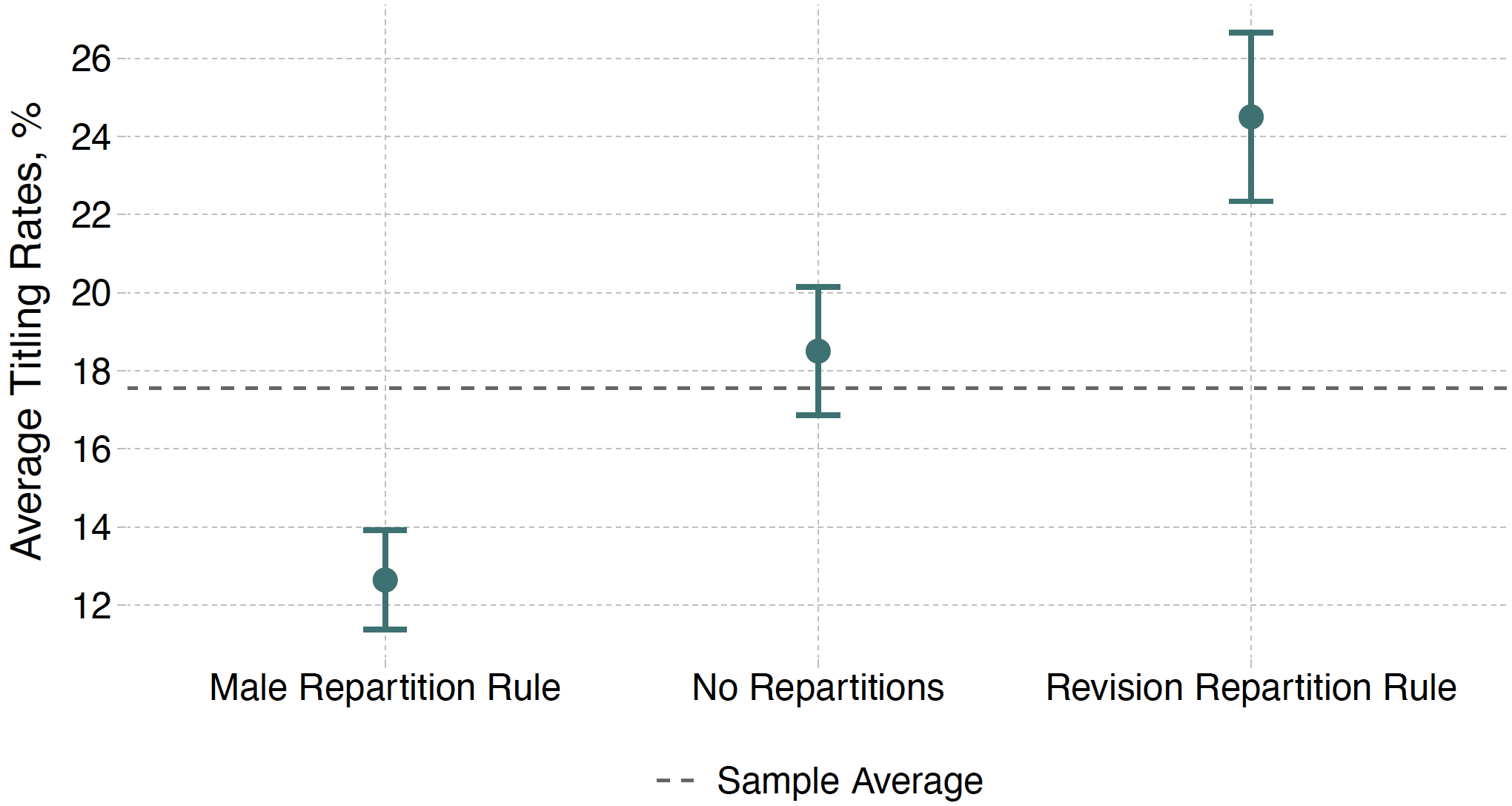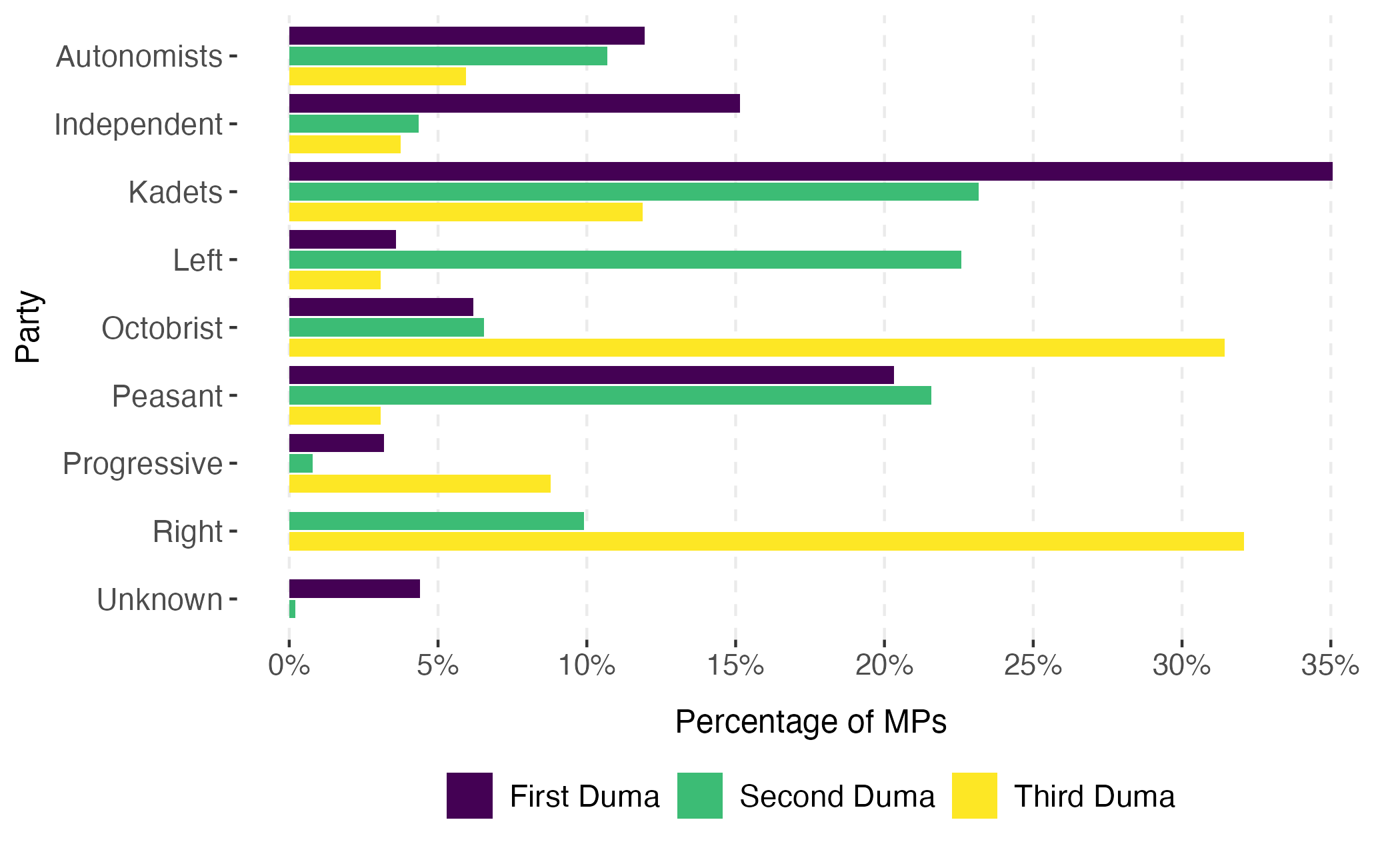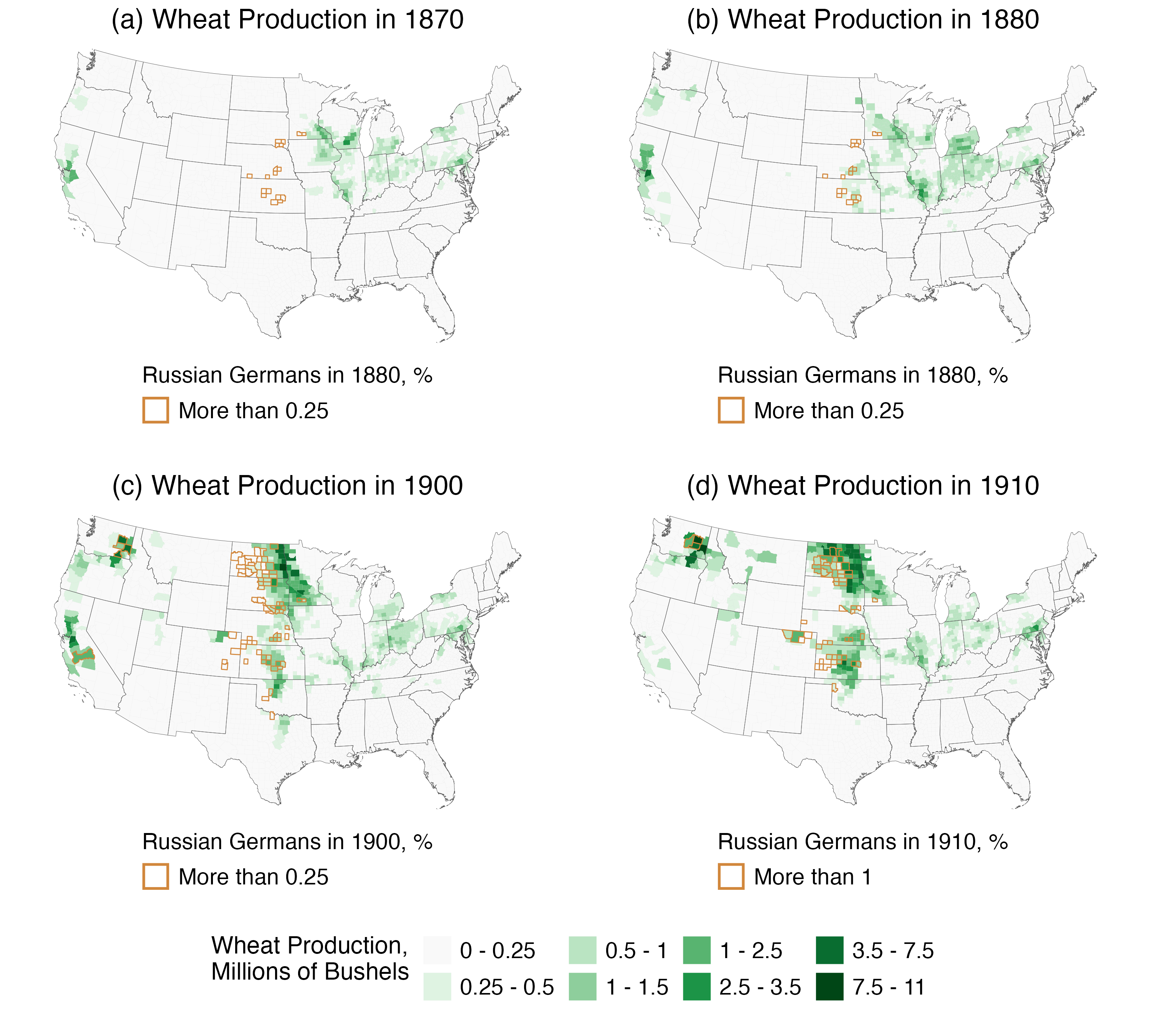In this paper, I measure the effect of conflict on the demand for frames of reference, or heuristics that help individuals explain their social and political environment by means of analogy. To do so, I examine how Russia's full-scale invasion of Ukraine in February 2022 reshaped readership of history and social science books in Russia. Combining roughly 4,000 book abstracts retrieved from the online catalogue of Russia’s largest bookstore chain with data on monthly reading patterns of more than 100,000 users of the most popular Russian-language social reading platform, I find that the invasion prompted an abrupt and substantial increase in readership of books that engage with the experience of life under dictatorship and acquiescence to dictatorial crimes, with a predominant focus on Nazi Germany. I interpret my results as evidence that history books, by offering regime-critical frames of reference, may serve as an outlet for expressing dissent in a repressive authoritarian regime.
Political Economy of Ideas
Reading Orwell in Moscow
Job Market Paper [Comparative Politics] | Chronicle of Book Censorship in Contemporary Russia
Media Coverage: Marginal Revolution, Important Stories (in Russian)
Presented at: SPSA (2026), Public Governance Workshop (2025), MPSA (2025)

Following Russia's full-scale invasion of Ukraine in February 2022, readership of books about the atrocities of dictatorial regimes and the lives of ordinary people under dictatorships increased significantly.
Institutional Change in a Historical Perspective
Traditional Institutions and the Limits to Land Titling Reforms in Russia
Job Market Paper, Under Review [Economic History]
Despite their potential economic benefits, land titling reforms around the world often encounter only moderate participation rates. Why do farmers hesitate to claim private land titles? To address this question, this paper examines the historical case of the 1906 land reform in the Russian Empire. For the first time in the country's history, the reform enabled peasants to obtain private titles to plots that had previously been held under communal tenure. Drawing on newly digitized commune-level data from the province of Simbirsk, the paper argues that the perceived benefits and costs of transitioning to private property were shaped by differences in the practice of land reallocation among the members of a commune, known as repartitions. I find that the reform was much less successful in communes where repartitioning had developed as a substitute for the land market. The results suggest that the design of land reforms must account for the incentive structures created by traditional property rights regimes.
Presented at: EHA (2025), Lewis Lab Graduate Student Workshop (2024), EPSA (2024), SIOE (2024), APSA (2023), Summer Workshop in the Economic History and Historical Political Economy of Eurasia (2023)

Job Market Paper, Under Review [Economic History]
Despite their potential economic benefits, land titling reforms around the world often encounter only moderate participation rates. Why do farmers hesitate to claim private land titles? To address this question, this paper examines the historical case of the 1906 land reform in the Russian Empire. For the first time in the country's history, the reform enabled peasants to obtain private titles to plots that had previously been held under communal tenure. Drawing on newly digitized commune-level data from the province of Simbirsk, the paper argues that the perceived benefits and costs of transitioning to private property were shaped by differences in the practice of land reallocation among the members of a commune, known as repartitions. I find that the reform was much less successful in communes where repartitioning had developed as a substitute for the land market. The results suggest that the design of land reforms must account for the incentive structures created by traditional property rights regimes.
Presented at: EHA (2025), Lewis Lab Graduate Student Workshop (2024), EPSA (2024), SIOE (2024), APSA (2023), Summer Workshop in the Economic History and Historical Political Economy of Eurasia (2023)
Under the 1906 land reform, titling rates varied across types of repartitioning, with the lowest observed in communes that periodically reallocated land across families based on the number of male family members.
Establishing a Parliament: the Political Economy of Elections in Late Imperial Russia (with Eugenia Nazrullaeva)
Which strategies does an authoritarian state employ to stall the process of democratization? This project examines the historical case of the Russian Empire to study the functioning of a legislative institution under autocratic pressure. In 1905, Tsar Nicholas II, yielding to the demands of the popular uprising, announced the creation of a new national institution of elected parliament, the State Duma. However, the tsarist regime imposed multiple constraints to control candidate selection and elections, including a class-based male suffrage system, an indirect electoral process, the persecution of the opposition leaders, and the manipulation of the electoral laws throughout the State Duma’s existence. Drawing from archival data and records of parliamentary debates, the project compares the effects of the two major events: the disenfranchisement of the members of the First Duma who signed the Vyborg Manifesto, which called for civil resistance against the dissolution of the State Duma in 1906, and the changes in electoral law following the dissolution of the Second Duma in 1907.
Presented at: Annual HPE Conference (2025), Virtual Workshop in Historical Political Economy (2024), MPSA (2024), Stanford Historical Social Science Workshop (2024)

The dissolution of the First Duma and the disenfranchisement of the Vyborg Manifesto signers in 1906 were followed by an increased representation of left-wing parties. The change of the electoral law after the dissolution of the Second Duma in 1907, in contrast, manufactured a pro-government majority composed of the centrist Octobrists and right-wing parties.
Dissemination of Knowledge
Immigrant Knowledge and the Growth of American Agriculture (with Jennifer Kowalski)
In this paper, we study the effect of immigrant location-specific knowledge on agricultural development. In particular, we focus on late nineteenth- and early twentieth-century Russian German immigration to the US, a case in which immigrants brought superior farming knowledge compared to the local population. We demonstrate that the inflow of Russian Germans, through their own farming practices as well as the diffusion of their knowledge to neighboring farmers, caused a shift in agricultural practices from less adapted to more adapted to local environmental conditions, specifically, crowding out corn in favor of wheat farming. Our findings highlight the importance of the match quality between immigrants and their receiving locations, as well as the extent to which knowledge diffusion across group boundaries can augment the impact of smaller immigrant groups.

In this paper, we study the effect of immigrant location-specific knowledge on agricultural development. In particular, we focus on late nineteenth- and early twentieth-century Russian German immigration to the US, a case in which immigrants brought superior farming knowledge compared to the local population. We demonstrate that the inflow of Russian Germans, through their own farming practices as well as the diffusion of their knowledge to neighboring farmers, caused a shift in agricultural practices from less adapted to more adapted to local environmental conditions, specifically, crowding out corn in favor of wheat farming. Our findings highlight the importance of the match quality between immigrants and their receiving locations, as well as the extent to which knowledge diffusion across group boundaries can augment the impact of smaller immigrant groups.
The figure plots the total production of wheat (in millions of bushels) in the US for 1870-1910. In Panels (A)-(C), a county is outlined in orange if the share of the county's Russian German population in that year is greater than 0.25%. In Panel (D), a county is outlined in orange if the county's Russian German population is greater than 1%. The threshold is larger in this panel in order to show that the highest concentrations of Russian Germans overlap with the highest concentrations of wheat production. As Russian Germans were not present in the US in 1870, Panel (A) includes 1880 settlement for reference. Our identification of Russian Germans is subject to census-to-census linking from 1920. For consistency, the unit of observation is a county defined by 1920 borders. For the sake of comparison, all maps have the same legend. There is no panel for 1890, as the full-count 1890 US Population Census is unavailable. There is no panel for 1920, as the 1920 US Agricultural Census does not include data on wheat production (in bushels).
Skilled Immigrants and Technology Adoption: Evidence from the German Settlements in the Russian Empire (with Timur Natkhov)
Explorations in Economic History, July 2021, Vol. 81, p. 1-18.
Larry Neal prize 2022 for best article in Explorations in Economic History
This paper examines knowledge spillovers across ethnic boundaries. Using the case of skilled German immigrants in the Russian Empire, we study technology adoption among Russian peasants. We find that distance to German settlements predicts the prevalence of heavy iron ploughs, fanning mills and wheat sowing among Russians, who traditionally ploughed with a light wooden ard and sowed rye. The main channel of technology adoption was German fairs. We show that heavy ploughs increased the labor productivity of Russian peasants. However, communication barriers precluded Russians from adopting skill-intensive occupations like blacksmithing, mechanics, carpentry, and other crafts. The results suggest that skilled immigrants may enhance local development through the introduction of advanced tools without transmitting their skills to a receiving society.
Culture and Social Norms
Ethnic-Specific Infant Care Practices and Infant Mortality in Late Imperial Russia (with Timur Natkhov)
Economic History Review, August 2023, Vol. 76 (3): 783-806.
The Russian Empire had the highest infant mortality rate in Europe at the beginning of the twentieth century. Using a variety of official statistical sources and qualitative evidence, this paper documents uniquely high infant mortality among ethnic Russians. In contrast, among other ethnic groups of the Empire, infant mortality rates did not exceed those of the European countries by much. The evidence suggests that the explanation for the Russian infant mortality pattern was ethnic-specific infant care practices, such as the early introduction of solid food, which increased the incidence of lethal gastrointestinal diseases. Our findings highlight the importance of traditional infant feeding practices for mortality in pre-industrial societies.
Media Coverage: The Long Run Blog
Presented at: Baltic Connections: Conference in Social Science History (2019)